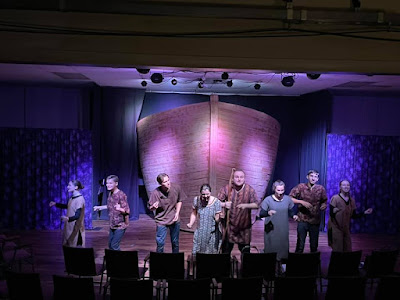Latter-day Saint Geeks: How does the story of Children of Eden compare to the actual events of the Bible?
Karen Dundore-Gulotta: I try to live my life in a way that is an example to others. Love other people, whether they are like me or not, no matter what they look like, their sexual preference, their beliefs, none of those things matter. I try to love all people the best I can. So I have a hard time conceiving that the story of Noah's Ark even happened, that God would wipe out so many children from the earth. I don't know what actually happened, but it helped me to think about the story as being symbolic rather than literal. Indeed, the story of Children of Eden doesn't exactly follow the Bible version of events, anyway. So we aren't here to argue what's factual or not, we are here to tell a story about parents and children.
Latter-day Saint Geeks: What are some of the lessons we can learn from Children of Eden?
Karen Dundore-Gulotta: We learn about parents and children and family relationships. We also learn about forgiveness. For instance, the character of Yonah (who has the Mark of Cain and is doomed to die in the flood), doesn't have a mean bone in her body. She forgives Noah for telling her she can't be on the ark, and she forgives the family for treating her like she was "less than". The musical states that "the Mark of Cain rose up in all of us, but it never rose up in you". There's also forgiveness in Eve's character. She forgives her son for killing Abel. Adam forgives Eve for disobeying The Father when she eats the fruit. I think there's a lot of lessons about forgiveness. You can ask for forgiveness from God, or within your own community, family, or circle of friends. We also learn that parents never give up on their children, even when they choose a path that isn't what we intended for them. The Father never gives up on Eve, and comes to her in a truly touching scene before she dies. Adam and Eve never give up on their children, even if they make big mistakes.
Latter-day Saint Geeks: How do the characters grow in Children of Eden?
Karen Dundore-Gulotta: There is repetition in the show, with lines and situations that are similar even though they play out differently in various family groups. It seems many mistakes are made over and over again. The horrors of the holocaust happen over and over, and we don't seem to learn from it. One of my favorite lines is in the end of the musical: "Our hands can choose to drop the knife. Our hearts can choose to stop the hating." I wanted the audience to feel that they were part of something bigger than themselves. They are part of a community. We can put down the knife and move forward even when we disagree on things. There is a character, Yonah, who has the "Mark of Cain". I knew I had to be careful with the mark I used, because at various times throughout history, people thought the Mark of Cain could be different things. People thought the Mark of Cain could be those who were disabled, or had a birthmark, or were disfigured in some way. People even believed that African American people had the Mark of Cain. So we made the Mark of Cain into a birdlike shape. In the play (not in the Bible), it's Yonah who releases the dove. So the dove AND the Mark of Cain became symbols of hope for us.
Latter-day Saint Geeks: Any last thoughts you want to share?
Karen Dundore-Gulotta: I believe that every person who is born has a purpose for being here. And that's what I try to convey to the kids in the show when I'm directing: no matter who you are or what you believe, we each have a purpose for being here. We can use our purpose for good or for evil. Remember, "Our hands can choose to drop the knife." The knife represents our opinions of people, especially those who are different than us. We can put down the knife. We can live and let live. Support each other. Forgive each other when we make mistakes, big or small. I think that's the biggest takeaway from the show.
Latter-day Saint Geeks: Thank you Karen.






Our hands can choose to drop the knife, our hearts can choose to stop the hating.” Got me in the feels.
ReplyDeleteThose are pretty powerful words, and they carry such an incredible message. Sometimes I don’t think we realize how much power we have.
DeleteI hope your feels are okay. Mine are still recovering.